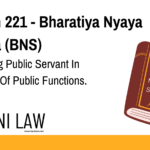Code: Section 213 BNS
Whoever refuses to bind himself by an oath or affirmation to state the truth,
when required so to bind himself by a public servant legally competent to require that he
shall so bind himself, shall be punished with simple imprisonment for a term which may
extend to six months, or with fine which may extend to five thousand rupees, or with both
Explanation of Section 213 BNS
Section 213 of the Bharatiya Nyaya Sanhita (BNS) addresses situations where an individual refuses to take an oath or affirmation when legally required by a public servant.
This provision ensures that judicial and legal proceedings are not hindered by non-compliance with legal obligations. The refusal to swear an oath or affirm a statement can obstruct the administration of justice.
Key Provisions of Section 213 BNS:
- Who Does This Law Apply To?
- Any person required to take an oath or affirmation by a public servant in judicial proceedings.
- What Constitutes an Offense?
- Refusal to take an oath or affirmation when required, without a valid reason.
- Punishment for Violation:
- Imprisonment: Up to six months.
- Fine: Up to ₹5,000.
- Both: In some cases, both penalties may be imposed.
Illustrations of Section 213 BNS
Example 1: Witness Refusing Oath in Court
A witness in a murder trial refuses to take an oath before testifying. Since this refusal can obstruct justice, they can be punished under Section 213 BNS.
Example 2: Government Inquiry
A person summoned in a corruption inquiry refuses to take an oath before giving testimony. This non-compliance can lead to legal consequences under Section 213 BNS.
Example 3: False Religious Exemption
A witness falsely claims their religion prohibits oaths but refuses to affirm their statement as well. Since they were given an alternative, their refusal is punishable.
Common Questions and Answers on Section 213 BNS
1. What is an oath or affirmation under this section?
An oath is a sworn declaration made before a court or public servant, affirming that the individual will speak the truth. An affirmation is a non-religious alternative to an oath.
2. Can a person refuse to take an oath based on religious beliefs?
Yes, but they must affirm their statement instead. If they refuse both, they can be punished under Section 213 BNS.
3. Does this section apply only in court cases?
No. This law applies to any judicial proceeding where a public servant requires an oath or affirmation.
4. What if a person refuses due to a genuine misunderstanding?
If a person had a valid excuse or was unaware of their legal duty, they may not be held liable. The refusal must be intentional.
5. Is Section 213 BNS a bailable offense?
Yes, offenses under Section 213 BNS are generally bailable and non-cognizable, meaning arrest without a warrant is not allowed.
Conclusion
Section 213 of the Bharatiya Nyaya Sanhita (BNS) ensures that judicial proceedings are not hindered by refusals to take oaths or affirmations. If a person refuses without a valid excuse, they can face imprisonment or a fine.
For more legal insights, visit ApniLaw today! 🚀








